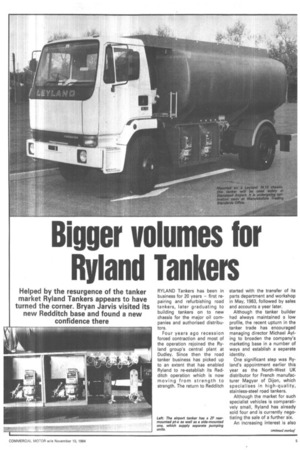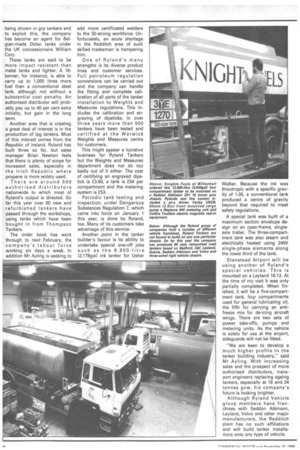Bigger volumes for Ryland Tankers
Page 59

Page 60

If you've noticed an error in this article please click here to report it so we can fix it.
Helped by the resurgence of the tanker market Ryland Tankers appears to have turned the corner. Bryan Jarvis visited its new Redditch base and found a new confidence there
RYLAND Tankers has been in business for 20 years — first repairing and refurbishing road tankers, later graduating to building tankers on to new chassis for the major oil companies and authorised distributors.
Four years ago recession forced contraction and most of the operation rejoined the Ryland group's central plant at Dudley. Since then the road tanker business has picked up to an extent that has enabled Ryland to re-establish its Redditch operation which is now moving from strength to strength. The return to Redditch started with the transfer of its parts department and workshop in May, 1983, followed by sales and accounts a year later.
Although the tanker builder had always maintained a low profile, the recent upturn in the tanker trade has encouraged managing director Michael Ayling to broaden the company's marketing base in a number of ways and establish a separate identity.
One significant step was Ryland's appointment earlier this year as the North-West UK distributor for French manufacturer Magyar of Dijon, which specialises in high-quality, stainless-steel road tankers.
Although the market for such specialist vehicles is comparatively small, Ryland has already sold four and is currently negotiating the sale of a further six.
An increasing interest is also being shown in grp tankers and to exploit this, the company has become an agent for Belgian-made Didac tanks under the UK concessionaire William Cory.
These tanks are said to be more impact resistant than metal tanks and lighter. A 16tonner, for instance, is able to carry up to 1,000 litres more fuel than a conventional steel tank, although not without a substantial cost penalty. An authorised distributor will probably pay up to 40 per cent extra initially, but gain in the long term.
Another area that is creating a great deal of interest is in the production of lpg tankers. Most of this interest comes from the Republic of Ireland. Ryland has built three so far, but sales manager Brian Newton feels that there is plenty of scope for increased sales, especially in the Irish Republic where propane is more widely used.
There are around 500 authorised distributors nationwide to which most of Ryland's output is directed. So far this year over 60 new and refurbished tankers have passed through the workshops, using tanks which have been bought in from Thompson Tankers.
The order book has work through to next February, the company's labour force working six days a .week. In addition Mr Ayling is seeking to add more certificated welders to the 30-strong workforce. Unfortunately, an acute shortage in the Redditch area of such skilled tradesman is hampering him.
One of Ryland's many strengths is its diverse product lines and customer services.
Full petroleum regulation conversions can be carried out and the company can handle the fitting and complete calibration of all parts of the tanker installation to Weights and Measures regulations. This includes the calibration and en graving of dipsticks. In over three years more than 500 tankers have been tested and certified at the Warwick Weights and Measures centre for customers.
This might appear a lucrative business for Ryland Tankers but the Weights and Measures department does not do too badly out of it either. The cost of certifying an engraved dipstick is £3.60. a tank is £54 per compartment and the metering system is £53.
Periodic tank testing and inspection, under Dangerous Substances Regulation 7, which came into force on January 1 this year, is done by Ryland, too. Many of its customers take advantage of this service.
Another point in the tanker builder's favour is its ability to undertake special one-off jobs such as the 9,900-litre (2,178gal) ink tanker for Usher Walker. Because the ink was thixotropic with a specific gravity of 1.05, a conventional tank produced a centre of gravity beyond that required to meet safety regulations.
A special tank was built of a maximum section envelope design on an open-frame, singleaxle trailer. The three-compartment tank was also steam and electrically heated using 240V single-phase elements along the lower third of the tank.
Stanstead Airport will be using another of Ryland's special vehicles. This is mounted on a Leyland 16.13. At the time of my visit it was only partially completed. When finished, it will be a five-compartment tank, tow compartments used for general lubricating oil, the fifth for carrying an antifreeze mix for de-icing aircraft wings. There are two sets of power take-offs, pumps and metering units. As the vehicle is solely for use at the airport, sideguards will not be fitted.
"We are keen to develop a much higher profile in the tanker building industry," said Mr Ayling. With increasing sales and the prospect of more authorised distributors, transport engineers replacing ageing tankers, especially at 16 and 24 tonnes gvw, his company's future is looking brighter.
Although Ryland Vehicle group members have franchises with Seddon Atkinson, Leyland, Volvo and other major manufacturers, the Redditch plant has no such affiliations and will build tanker installations onto any type of vehicle.




































































































